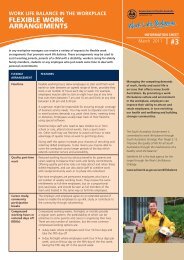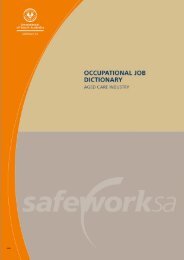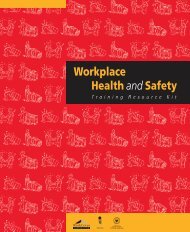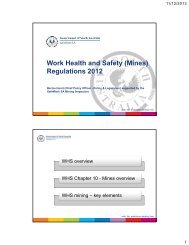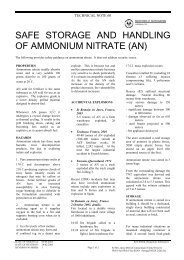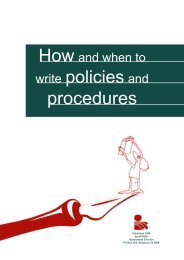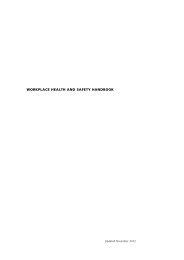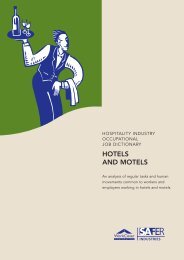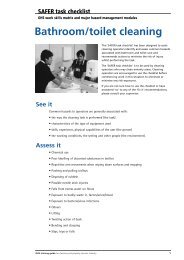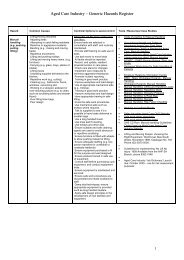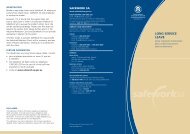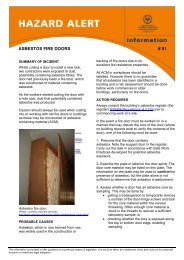Alcohol Drugs Workplace Alcohol Drugs Workplace - SafeWork SA ...
Alcohol Drugs Workplace Alcohol Drugs Workplace - SafeWork SA ...
Alcohol Drugs Workplace Alcohol Drugs Workplace - SafeWork SA ...
Create successful ePaper yourself
Turn your PDF publications into a flip-book with our unique Google optimized e-Paper software.
14<br />
If the impaired person refuses to cooperate:<br />
• contact the person specified in the policy or supporting procedures, which may include<br />
the union representative, the employer or other person specified in the policy;<br />
• assess dangers; and<br />
• remove all surrounding people at risk from the location of the impaired person or isolate<br />
the impaired person.<br />
After the incident and when the employee returns to the workplace not impaired<br />
by alcohol and/or other drugs:<br />
• sick leave, special leave or sickness benefits advice should be arranged;<br />
• information and advice about substance abuse, assessment and counselling should be<br />
provided;<br />
• the policy regarding further incidents should be made clear to the employee, but the<br />
normal procedures concerning failure to perform should apply.<br />
Further incidents: should further incidents of being impaired by alcohol or other drugs<br />
occur by the same employee:<br />
• repeat the above procedure;<br />
• follow disciplinary procedures outlined in the alcohol and other drug policy or other<br />
written procedures;<br />
• keep all parties informed; and<br />
• encourage the impaired person to seek information and counselling and treatment if<br />
appropriate (Source: Occupational Safety and Health Bulletin. Information Australia).<br />
Self-assessment by the employee<br />
The policy should state that employees are not to present themselves for work if they have<br />
consumed alcohol and other drugs that affect their ability to work safely. The policy should<br />
also state that employees should not remain at the workplace if they become affected by<br />
alcohol and other drugs.<br />
The chances of a person recognising that they are impaired will be improved if they are<br />
informed and educated about the effect of alcohol and drugs on their ability to work<br />
safely.<br />
Simple self-assessment tools may also be useful in assisting persons to assess their own<br />
problems and attitudes. These tools could be developed within an organisation or obtained<br />
from services available in the community. Such self assessment tools can also have a<br />
positive impact on a person’s behaviour and provide a shared understanding within the<br />
workplace of the characteristics of impairment.<br />
Education, training and healthy lifestyle programs can also have a positive impact on a<br />
person’s behaviour and educate them about the health and safety risks of alcohol and<br />
other drugs.<br />
Testing for illicit drugs<br />
When considering the introduction of testing for illicit drugs, employers should ensure the<br />
nature of the policies and programs is appropriate to the level of risk in the workplace.<br />
If testing is introduced it should also form part of a comprehensive alcohol and drug<br />
program, which in turn is part of a general health and safety program.<br />
Employers and employees should be aware that drug testing does not measure<br />
impairment. Current testing techniques do not disclose the quantity of the drug consumed,<br />
when it was consumed or the level of impairment that has resulted from the drug<br />
consumption.<br />
Guidelines for Addressing ALCOHOL & OTHER DRUGS IN THE WORKPLACE



